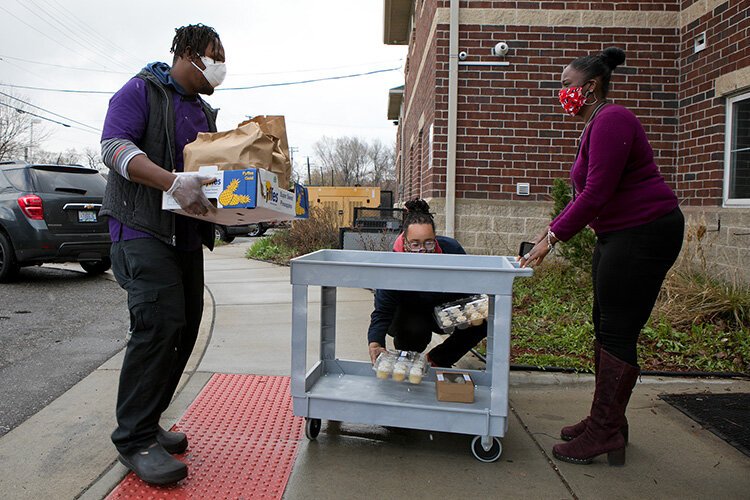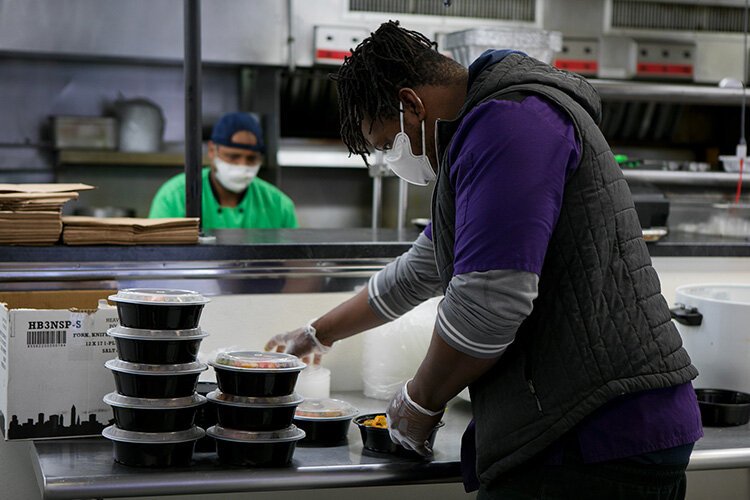Initiative employs Detroit restaurateurs of color to feed homeless, at-risk girls in Detroit
Pay It Forward: Power a Business & Feed the Homeless aims to support Detroit restaurants owned and run by people of color by paying them to cater meals for 100 people served by the Neighborhood Service Organization and Alternatives For Girls.
Around this time last year, Godwin Ihentuge opened the doors to his Afro-Caribbean restaurant Yum Village in New Center. With the COVID-19 pandemic essentially shutting down restaurants except for carryout and delivery per Gov. Gretchen Whitmer’s executive order last month, coronavirus is “forcing us to change,” Ihentuge says.
“The entire first quarter ramping up to our year anniversary was solely dealing with coronavirus,” he says. The first week in March, he says the restaurant saw $12,000 in sales. The week of Whitmer’s stay-at-home order? Sales were $2,500.
Ihentuge isn’t the only restaurateur who has been hit hard by the pandemic. According to the Michigan Restaurant & Lodging Association, the restaurant industry lost an estimated $491 million in sales and more than 72,000 jobs during the first 22 days of March.
But Ihentuge is determined to make his business work. “We just got here, we don’t plan on going anywhere, and we’re going to need to evolve to stay alive,” he says. As a part of that pivot, he’s getting ready to launch Yum Village Market Pantry on Monday, April 20. Yum Village has been closed for business the past couple of weeks in preparation for that.
Ihentuge says he knows many “people on the front lines, either in the health care profession, working as first responders or EMTs. And so during this two-week time period of closing, we also want to take that time to focus on providing dope meals for everyone in that category. And I consider the disenfranchised population as being on the front lines.”
Along with Melanie D’Evelyn, Jeremy Lewis, Shelley Danner, and Sarah Craft, all of whom work in entrepreneurship and nonprofits in the city, Ihentuge co-founded Pay It Forward: Power a Business & Feed the Homeless. The initiative aims to support Detroit restaurants owned and run by people of color by paying them to cater meals for 100 people served by the Neighborhood Service Organization and Alternatives For Girls.
At Alternatives for Girls, which also receives meals from another chef collaborative spearheaded by David Rudolph, Dawn Barrack, director of fund development, says meals are usually cooked on-site for the girls and women at the shelter. But with the pandemic, “we are [down to] essential staffing only so we are short-staffed. … the fact that these meals are being made and delivered, Monday through Friday, takes [cooking] off the plate of the counselors and allows them to really focus on the counseling aspect, and really being there for mental health and taking care of the children. [The meals from Pay It Forward] could not have come at a better time.”
Ihentuge delivered assorted rice with chicken, plantains, roasted Brussels sprouts, and chickpeas to Alternatives For Girls on Wednesday, April 15. “Today allowed me to have two people on the schedule. And that’s more than I would have if I didn’t have that money,” he says.
The other restaurants and owners participating in the Pay It Forward initiative include Detroit Pepper Company, Marlin Hughes; Norma G’s, Lester Gouvia; T’Mo’s BBQ, Tito Dotson; Rincon Tropical, Lizaida Moreno; Table No. 2, Omar Mitchell; and Nya Marshall, Ivy Kitchen. Table No. 2 and Ivy Kitchen were recently added, enabling the campaign to bring meals to NSO and Alternatives For Girls seven days a week. Two local bakeries are also providing desserts twice a week: Garnet Gullett of Terri’s Cakes and Rhonda Crenshaw Morris of Lucki’s Cheesecakes.
Restaurants are paid $8-10 per meal, or close to $1,000 per daily order, the Pay It Forward team says.
“There are a lot of efforts happening in the city to support those in need during this crisis but we wanted to prioritize black-and brown-owned businesses in Detroit neighborhoods to help make sure they’re still here when this is over,” says Lewis, one of the campaign creators. “The community is really stepping up in a grassroots way to show their support — both to restaurants and those in the hardest situations.”
The group’s Patronicity crowdfunding campaign raised more than $33,000 from 370-plus donors in 10 days. As of 6 p.m. Friday, April 17 it’s raised $36,110 of its $40,000 goal. Other funding comes from COVID-19 response grants, including the Detroit Community Resilience Prize from the Desai Sethi Foundation and the REALITY Micro Grant from the Schusterman Family Foundation.
The group recently partnered with Soulcial Scene, a nonprofit dedicated to promoting black-owned businesses, to serve as the campaign’s nonprofit fiduciary. Donations will be accepted until May 1 on either Soulcial Scene’s donation page or the crowdfunding platform.






